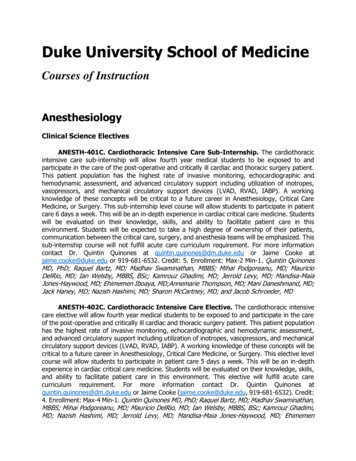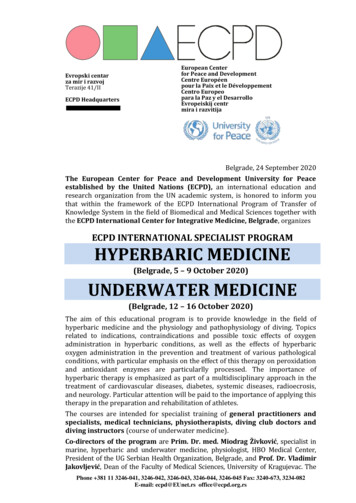
Transcription
Duke University School of MedicineCourses of InstructionAnesthesiologyClinical Science ElectivesANESTH-401C. Cardiothoracic Intensive Care Sub-Internship. The cardiothoracicintensive care sub-internship will allow fourth year medical students to be exposed to andparticipate in the care of the post-operative and critically ill cardiac and thoracic surgery patient.This patient population has the highest rate of invasive monitoring, echocardiographic andhemodynamic assessment, and advanced circulatory support including utilization of inotropes,vasopressors, and mechanical circulatory support devices (LVAD, RVAD, IABP). A workingknowledge of these concepts will be critical to a future career in Anesthesiology, Critical CareMedicine, or Surgery. This sub-internship level course will allow students to participate in patientcare 6 days a week. This will be an in-depth experience in cardiac critical care medicine. Studentswill be evaluated on their knowledge, skills, and ability to facilitate patient care in thisenvironment. Students will be expected to take a high degree of ownership of their patients,communication between the critical care, surgery, and anesthesia teams will be emphasized. Thissub-internship course will not fulfill acute care curriculum requirement. Credit: 5. Enrollment: Max-2 Min-1. Quintin QuinonesMD, PhD; Raquel Bartz, MD; Madhav Swaminathan, MBBS; Mihai Podgoreanu, MD; MauricioDelRio, MD; Ian Welsby, MBBS, BSc; Kamrouz Ghadimi, MD; Jerrold Levy, MD; Mandisa-MaiaJones-Haywood, MD; Ehimemen Iboaya, MD;Annemarie Thompson, MD; Mani Daneshmand, MD;Jack Haney, MD; Nazish Hashimi, MD; Sharon McCartney, MD; and Jacob Schroeder, MDANESTH-402C. Cardiothoracic Intensive Care Elective. The cardiothoracic intensivecare elective will allow fourth year medical students to be exposed to and participate in the careof the post-operative and critically ill cardiac and thoracic surgery patient. This patient populationhas the highest rate of invasive monitoring, echocardiographic and hemodynamic assessment,and advanced circulatory support including utilization of inotropes, vasopressors, and mechanicalcirculatory support devices (LVAD, RVAD, IABP). A working knowledge of these concepts will becritical to a future career in Anesthesiology, Critical Care Medicine, or Surgery. This elective levelcourse will allow students to participate in patient care 5 days a week. This will be an in-depthexperience in cardiac critical care medicine. Students will be evaluated on their knowledge, skills,and ability to facilitate patient care in this environment. This elective will fulfill acute carecurriculum requirement. Credit:4. Enrollment: Max-4 Min-1. Quintin Quinones MD, PhD; Raquel Bartz, MD; Madhav Swaminathan,MBBS; Mihai Podgoreanu, MD; Mauricio DelRio, MD; Ian Welsby, MBBS, BSc; Kamrouz Ghadimi,MD; Nazish Hashimi, MD; Jerrold Levy, MD; Mandisa-Maia Jones-Haywood, MD; Ehimemen
Iboaya, MD; Sharon McCartney, MD; Annemarie Thompson, MD; Mani Daneshmand, MD; JackHaney, MD; and Jacob Schroeder, MDANESTH-403C. Culinary Medicine Program. The Culinary Medicine Program is amedical nutrition therapy course that targets the crucial role that nutrition plays in preventionand treatment of chronic diseases. The Program includes lectures and discussions on nutrition forspecific disease states and a hands-on cooking course so that the students can learn how toprepare meals tailored for the different disease states. This course will be taught by Duke facultyand staff whose careers are driven by clinical and research interests in topics related to nutrition.Their teaching will be supplemented by a curriculum from the Goldring Center for CulinaryMedicine at Tulane University, which has been used in over 50 sites across the country (medicalschools, nursing schools, etc.). This course will be held on Tuesday evenings from 5:30p-8:30p.Students will meet at the Duke Diet and Fitness Center. Enrollment Maximum: 16; Minimum: 15.Credit: 1. Grading basis is Credit/No Credit. Students participate actively inassigned patient care and clinical projects. Well-focused segments of ongoing clinical workprovide intensive exposure to clinical physiology and pharmacology. Students will be assigned anattending physician (mentor), desk and computer space in the Hyperbaric Center. Consultativeservices are provided for inpatients and outpatients from orthopedics, medicine, radiationoncology, intensive care units, and preoperative and postoperative care units. Specific indicationsfor hyperbaric oxygen therapy are used in clinical care and in developing translational projects.Students are guided in producing concrete clinical presentations and reports related to the field. Students should meet for rounds on the first day of classes promptly at7:30 a.m. The location is Hyperbaric Center Library, 0588 White Zone, CR II Building. Credit: 4.Enrollment Max 1. Claude Piantadosi, MD, and staffANESTH-440C. Clinical Anesthesiology. The student will participate in the pre-, intra-,and post-operative anesthetic management of patients while assigned to an individual residentor attending anesthesiologist. Usually, (s)he will spend two weeks in the general Operating rooms,one in the Cardio-thoracic Operating Rooms, and a fourth week in subspecialty areas includingthe Hyperbaric facility, The Acute Pain Management Service, and others. Learning opportunitieswill include pre-operative patient evaluation, anesthetic technique selection, airway management,pharmacology, physiology, and anatomy, as well as procedures such as vascular access, includingcentral venous and arterial line placement, and patient monitoring. These areas will be reinforcedby lectures, Grand Rounds, and other conferences. In the fall, priority in registration is given tostudents considering careers in Anesthesiology. Students MUST attend the first day of the section,and are strongly advised not to miss any of the first week. More than 4 absences are notpermitted. Schedules for the class will be emailed out prior to the start of the course. Prerequisite: NOTE: This course may require rotations at the VA Medical Center. Students mustcomplete the required VA Medical Center paperwork no less than 60 days prior to the first day ofclasses in order to participate. For questions and to obtain permission numbers, please contact
Elizabeth Futrell () or 919-668-3400. Permission is required forenrollment. Enrollment Max: 4. Credit: 4. Elizabeth Malinzak, MD and StaffANESTH-441C. Subinternship in SICU. This course is designed to broaden the student'sknowledge and experience in managing critically ill surgical patients. Under supervision, studentsfunction as sub-interns in the Surgical Intensive Care Unit (SICU). Students are assigned theirown patients and actively participate in daily rounds as part of the SICU team. There is a dailylecture on aspects of critical care. Students take call one night in four and work on a one-on-onebasis with SICU house staff in the supervised management of critically ill patients. Time may bespent in the SICU at Duke University Medical Center (trauma, vascular surgery, liver-kidneypancreas transplantation, general surgery) and/or the SICU at the Durham VA Medical Center(cardiothoracic and vascular surgery, general surgery). There is emphasis on teaching ofprocedures and techniques necessary for the management of all critically ill patients includinghemodynamic assessment and monitoring, cardiovascular resuscitation and use of vasoactivedrugs, ventilator management including ARDS, prevention and management of nosocomialinfections, and ethical decision making in ICU. Students are formally evaluated by the SICU housestaff and the attending physician. C-L: SURGERY 441C. Credit: 5. Enrollment: max 2. ChristopherYoung, MD; Kelli Brooks, MD; Nancy Knudsen, MD; John Lemm, MD; Eugene Moretti, MD/MHSc;Ehimemen Iboaya, MD; Arturo Suarez, MD; Xueyuan (Shelly) Wang, MD; Lisa Pickett, MD;Vanessa Schroder, MD; Courtney Sommer, MD; Cory Vatsaas, MD; and Steven Vaslef, MD, PhD.VA Attendings: Atilio Barbeito, MD; Raquel Bartz, MD; Charles Brudney, M.B., CH.B.; and KarthikRaghunathan, MDANESTH-445C. Physiology & Medicine of Extreme Environments. Advanced topicsin the physiology and medicine of: altered ambient pressure, immersion, gravity, temperature,breathing gas composition and hibernation. Environments considered include: diving andhyperbaric medicine; hot/cold terrestrial and water operations; microgravity and high-gacceleration; high altitude; space. Basic mechanisms and medical management of associateddiseases are examined including: decompression sickness, altitude sickness, hypothermia andhyperthermia, hypoxia, carbon dioxide and carbon monoxide poisoning, oxygen toxicity. Practicalapplications: pressure vessel design and operation, life support equipment, cardiorespiratoryphysiology measurements at low and high pressure, simulated dive and flight (optional). Reading:The Biology of Human Survival Life and Death in Extreme Environments, Claude A Piantadosi(author) Pre-requisites: Human anatomy and physiology. Attendance, either on-line via webex orin person is MANDATORY unless otherwise approved by the course director, in order to receivecredit. Examinations are open notes / open book short essay. The course will meet weekly onThursday evenings from 5:00pm until 7:30pm beginning in January, in the Hyperbaric CenterLibrary (room 0584). Basement, White Zone, Bldg. CR II. Email permission ofinstructor is required. John Freiberger, MD/MPH and Richard Moon, MD. After on-line enrollmenthas been completed for other spring courses, students must forward the email approval for manual enrollment in ANESTH 445C. Credit: 1. Enrollment: max 15,min. 10. John Freiberger, MD/MPHANESTH-446C. Acute and Chronic Pain Management. Students will participate in bothinpatient and outpatient pain management. Each student is assigned daily to an individual fellowor attending physician who supervises the student's active involvement. This involvementemphasizes a multidisciplinary approach appropriate for the individual patient. Topics reviewed
include pharmacotherapy including opioid management, interventional procedures such asepidural and peripheral nerve catheter placement, nerve blocks, neurolytic procedures, as well asimplantable devices. The benefits of physical and psychological therapy are stressed. Studentswill observe and/or participate in various interventional procedures. In addition to this clinicalwork, students attend weekly pain conference and grand rounds. The course is offered eachelective period throughout the year. More than two absences must be made up, and if more thanfive absences are anticipated, the elective should be re-scheduled. Dr. Roy the week before the rotation for information about where to arrive on thefirst day. Credit: 4. Enrollment: max 2, min 1. Lance Roy, MD and Jace Carter, MDCommunity and Family MedicineClinical Science ElectivesCOMMFAM-401C. Sub-Internship in Family Medicine. Sub internship inFamily Medicine. This course provides senior medical students with an intense patientand population-oriented clinical rotation with responsibilities and autonomy similar to thatof an intern. This clerkship will provide a unique opportunity to participate in thedepartment’s effort to test new models of care in the delivery of team-based chronicdisease management in the ambulatory and community setting. Students will see patientsin the same format as entering interns with a patient panel supervised by senior facultyat Duke Family Medicine Center. Each clerk will participate in a PDSA project inconjunction with the Population Health Improvement Leadership curriculum team. 4050% of the rotation will be direct clinical care in the Duke Family Medicine Center. Theremaining 50-60% will occur with the Population Health Management Resident. Clinicalinstruction and supervision on each patient encounter is provided by senior level housestaff and faculty members of the Department of Community and Family Medicine.Students are advised to contact the department as early as possible for course approval(at least eight weeks in advance). No drops are permitted within 60 days of the first dayof the rotation. Priority will be given to students with an interest in a career in primarycare. For more information please contact the Coordinator of Medical Student Programsat 681-3066. Permission is required. Credit: 5. Enrollment: max 2 per session. LorraineSease, MD, and Nancy Weigle, MDCOMMFAM-403C. Community Clinic Leadership Elective - Holton Clinic.Over the course of the both semesters students will provide leadership to the DSOMHolton Clinic, operating at Holton Wellness Center from 5:30-9:30pm on Fridays. Underthe supervision of a clinician, students will lead the clinical team through overseeing thecare of patients, developing care management plans, and supervisin
